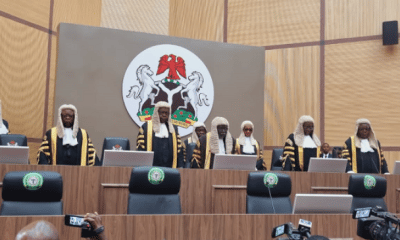Nigeria News
Akpabio Proposes Punishment For Judges Misusing Ex Parte Order

The president of the Nigerian Senate, Godswill Akpiabio, has suggested a decisive punishment for judges misusing ex parte orders, especially in addressing political matters.
Naija News reports that ‘Ex parte’ is a term commonly employed in civil procedure to describe motions seeking orders that can be granted without the need for a response from the opposing party.
Typically, these orders are temporary in nature and remain effective until additional hearings can be conducted, such as in the case of a temporary restraining order.
However, speaking at the National Summit on Justice held in Abuja today, Akpiabio, who spoke on the theme “Repositioning the Justice System, Constitutional, Statutory and Operational Reforms for Access and Efficiency,” said it becomes crucial for the National Judicial Council (NJC) to implement strict supervision to prevent the abuse of ex parte orders.
He said: “We recommend prompt and decisive punishment for erring judges who are found to be involved in this abuse.
“We further propose that the NJC establish clear and detailed standards governing the issuance of ex parte orders, accompanied by a defined set of sanctions for violations. These sanctions should be severe enough to deter people from future abuses.
“We recommend that the NJC should conduct regular audits and reviews of ex-parte orders issued by judges to ensure compliance with established standards.”
The proactive approach, as the Senate President mentioned, would aid in the early detection of abuse patterns and the prompt implementation of corrective actions.
Furthermore, Akpabio highlighted the significance of continuous training and education for judges regarding the ethical and responsible utilization of judicial discretion when granting ex parte orders.
Akpabio also advocated for reform in the handling of interlocutory appeals in civil cases, stating that the existing appeals frequently result in unnecessary delays, prolonged litigation, and additional burdens on the courts.
“As was done in the criminal jurisprudence during the enactment of the Administration of Criminal Justice Act, 2015, we propose that all appeals in civil cases should be taken only after the conclusion of the substantive case.
“This change will accelerate judicial processes, reduce backlog, and ensure that litigations are not unduly prolonged by intermediate appeals.
“Another area requiring urgent reform is the process of obtaining the Attorney General’s consent before executing judgments.
“This requirement often acts as a bottleneck, delaying justice and undermining the autonomy of our judicial system.
“We propose modifying this requirement to facilitate a swifter execution of judgments, thereby enhancing the efficiency and effectiveness of our justice system,” the Senate President said.
Akpabio emphasized that these types of reforms instill confidence in the justice system and enhance the overall effectiveness of legal proceedings involving the government.
He highlighted that the National Assembly Committee on Constitutional Amendment and the Committee on Amendment of the Electoral Act were collaborating to ensure the smooth integration of these transformative justice reforms into the ongoing amendments.
“This integration will not only fortify our constitution and electoral framework but will also ensure that justice both in letter and in spirit becomes more attainable for every Nigerian.
”The national Assembly is not unaware of the delays and backlogs plaguing the courts, adding that the issues make justice to be seen as inaccessible and inefficient,” Akpabio said.
The Senate president highlighted the national assembly’s commitment to allocating resources for implementing judicial reforms. These reforms will involve using digital tools to improve case management efficiency and ensure that justice is not delayed or denied.
He urged all stakeholders, including the legislative, executive, and judiciary branches, to support these essential reforms.
“Together, we can build a justice system that is fit for the 21st century,” Akpabio noted.
He conveyed his appreciation to President Bola Tinubu for selecting Lateef Fagbemi (SAN) as the Minister of Justice, emphasizing that Fagbemi is highly qualified for the position.
Furthermore, he extended his gratitude to the Nigerian Bar Association leadership and the National Judicial Council under Justice Olukayode Ariwwoola for their continuous commitment and cooperation.
Akpabio emphasized that reforming the justice system demands steadfast dedication and united endeavours to achieve the goals of improving justice administration and consistently upholding the rule of law in Nigeria.












